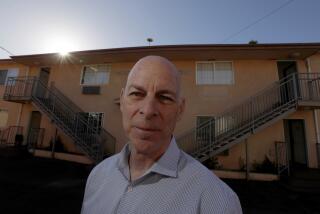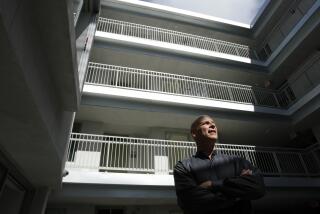Federal Program Is Part of Business’ Success : J. Bruce Camino’s 5-year-old architectural and engineering firm Development One Inc. has grown since its start in his garage and is now exploring projects overseas.
ORANGE — The two-year slump in Orange County’s building industry has been especially tough on architects and other service providers that depend on construction work.
But with the aid of a federal small-business program, J. Bruce Camino’s 5-year-old architectural and engineering firm is still growing.
From meager beginnings in his garage, Camino has moved from home remodeling jobs to design work on a $75-million golf course-country club project in Japan. He pays flying visits to projects throughout the state.
Camino’s secret of success was to get his Orange company--Development One Inc.--designated as a disadvantaged firm under the U.S. Small Business Administration’s Section 8(a) program in 1990 and to keep his fees low.
He has since won several U.S. government contracts, including one at the Marine Corps Air Ground Combat Center at Twentynine Palms. That project last year required the design of a post office and a canine training facility and the remodeling of the base’s 10,000-square-foot gymnasium.
Development One is one of only two architectural firms among the Orange County companies in the Section 8(a) program, which is designed to help minority-owned firms compete for a share of government contracts. Last fiscal year, the government awarded $120.4 million worth of contracts to firms in Region IX, composed of California, Arizona, Nevada, Hawaii and Guam, said Sandy Sutton, assistant district director for business development at the Small Business Administration office in Santa Ana.
Of the 101 Orange County companies in the program, 84% of them won at least one contract last fiscal year, contrasted with a regional average of 50%, she said.
Through the program, the federal government--acting as the prime contractor--channels government money to small businesses by encouraging the large U.S. corporations with which it contracts to buy goods and services from minority-owned firms. The program targets companies that are at least 51% minority owned for no-bid government contracts. Companies are disqualified from some projects once they reach a certain revenue level.
Indeed, Camino’s success has not been without incident. Just two years after he and two friends founded a company to provide architectural services, construction and financial analysis under one roof, they parted ways. For six months, Camino struggled to revive his firm, renamed it Development One and became certified under the 8(a) program.
Once certified, demand for Development One’s architectural and engineering services grew. The company concentrated on military, international and school-related projects.
The big break came in February, 1990. Camino was tipped off by a friend who was teaching English in Osaka, Japan, that a Japanese developer was looking for a small architectural firm to design a Western-style country club at a newly built golf course.
Camino quickly sent the developer brochures about his company and samples of his past work. In less than three weeks, the developer called to discuss the project and flew him to Osaka.
Four hours after arriving, the Japanese executive gave Camino the job to design several facilities at his golf course, including a $10-million teahouse and residential facility for the club’s maintenance crew. The developer paid him a retainer fee on the spot.
“Unlike our clients in the U.S., the Japanese are willing to try new design ideas, and they are definitely more flexible with their design and construction budgets,” Camino said.
Development One’s revenue more than doubled last year to reach $500,000. And based on current government and other contracts, Camino is projecting sales to reach at least $600,000 by year-end. Through the Small Business Administration, the firm is exploring projects in Guam, Singapore and Thailand.
“I want my business to be a $5-million concern in five years,” Camino said.
More to Read
Inside the business of entertainment
The Wide Shot brings you news, analysis and insights on everything from streaming wars to production — and what it all means for the future.
You may occasionally receive promotional content from the Los Angeles Times.










